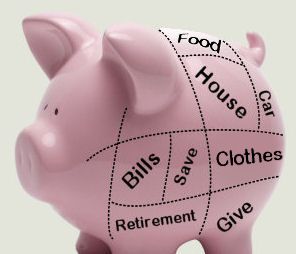We’ve asked our email subscribers, What is Your Budgeting Question? This page is growing. If you have a budget question, please use our contact form and send it in!
On this page, we answer 17 of the most common budget questions with practical solutions.
We talk about all aspects of budgeting and answer some very practical questions, that sometimes folks are afraid to ask.
TABLE OF CONTENTS
- 1 What is Your Budgeting Question? Want a Better Way to Control Your Spending?
- 2 Budgeting Question 1: Can I Use a Credit Card to Reconcile My Budget?
- 3 How Can I Budget on a Fluctuating Income? Commission
- 4 Budgeting on a Fluctuating Income Question – Self-Employed
- 5 How Contentment Helps You To Budget Better
- 6 Marital Disagreement Over Money Management
- 7 How Much Money Do You Fund in Your Budget Categories?
- 8 Money Matters in a Very Dysfunctional Marriage
- 9 Planning for Miscellaneous Spending?
- 10 Laid Off – Need to Stretch the Budget
- 11 How to Budget Question:
- 12 Budget Question Regarding Medical Crisis & Car Payments
- 13 Is More Money the Solution?
- 14 Getting Ahead as a Single Mom
- 15 Trying to Survive on a Low Income
- 16 Questions about Student Loans and Buying a House
- 17 Establishing Monthly Grocery Limits
What is Your Budgeting Question? Want a Better Way to Control Your Spending?
The more control you have over your money, the more money you’ll have.
We’ve helped other people use YouNeedABudget (YNAB) and found that it is the best computer-based budgeting system out there. YNAB uses the same system we describe in our book. It’s better than Everydollar, Quicken and MS Money, all of which only track your spending after the fact. YNAB helps you save money in advance of your purchases.
You’ll be amazed at what happens when you know that the money is in the bank before you spend. You’ll have so much more confidence and peace, and you’ll probably spend much less too. YNAB claims that you’ll save at least 10% by utilizing their system.
We’ve been using a budget system like YNAB since 1982 and we’ve never had a car payment, paid off our first house in 9 years and paid cash for everything else. Budgeting isn’t a restriction — it creates financial freedom.
YNAB offers a free 30-day trial of its system. Give it a try and see if it helps you manage your money better. Steve – Scottsdale, AZ
Budgeting Question 1: Can I Use a Credit Card to Reconcile My Budget?

I created a binder and all the sheets to copy the budgeting system you described in your book, America’s Cheapest Family Gets You Right on the Money. I really like how your budget system allows a family to “save” in advance for purchases and designates money for different specific categories.
Our Money Issue
We are not in debt. but we use a credit card for every purchase. And then we pay our credit card every month, completely.
I know this is not the “norm” for most people. We like this because we use fewer checks and we also receive cash back, which adds up quickly. We can use our cashback to pay for 2 credit card bills each year!
So trying to do your budget the other night, it’s been very confusing. We have our cc statement for all purchases. The charges are from March, but we pay the bill in April.
I can’t seem to figure out how to do this system every 2 weeks or once a month because we’re paying the credit card bill 30 days after the charges were made.
We like doing Credit Card Budgeting for two reasons:
- Because we use fewer checks.
- We receive cash back, which adds up quickly.
Will our budget always be behind one month because we’re paying the credit card bill 30 days after the charges were made?
Help, please! I am assuming that maybe this has been brought up before and there is a simple tweak to the system for this. Thank you for your time and I enjoyed reading your book.
The Solution for Budgeting with Credit Cards
Congratulations on taking the time to set up your budget. This is one of the reasons we avoid using credit cards—it makes budgeting more difficult, but . . . not impossible.
Here are two things you can do to make budgeting with Credit Cards work with our America’s Cheapest Family Budget System.
Step 1:
Simply write down each credit card expense in your checkbook register as you spend the money. Basically, treat it like you wrote a check. Since you only use your credit card, your checkbook register will only contain charges from that card. This is easier than using a credit card in addition to a debit card and/or checks.
Step 2:
Then record each expense on the individual account pages when you manage your budget every pay cycle. When the credit card bill arrives, check off each item in your checkbook as you would when you balance a checking account to the bank statement.
Step 3:
Write one check (or do an automatic payment) to cover the full amount of the credit card bill, but don’t record that expense in your budget (if you did, you’d basically be entering double the amount because you already recorded each individual expense).
Record the check in your checkbook register (it’s really just a formality and a way to confirm that the payment was made), but DON’T subtract that total amount from your checkbook balance . . . because all of the individual expenses have already been recorded in the checkbook and in the budget.
It is more work, but it can be done. You’re smart and careful, with a little persistence and creative thinking you’ll solve this problem and be on your way to becoming a black-belt budgeter.I think we have answered, What is your budget question regarding credit cards.

How Can I Budget on a Fluctuating Income? Commission

Making a budget is difficult because my paycheck is not the same every pay date. Are there any tricks or tips you can offer?
The Solution for Budgeting on a Fluctuating Income
We’ve lived with a fluctuating income for many years. We base our monthly budget on a low average of our income. We’ve tracked earnings over several years to arrive at this number.
In the months when our income is higher, we put the extra money into a budget category called “Paycheck Holding.” Then we can draw upon it during months when we don’t earn enough to fill our budget categories.
We keep several “optional” budget categories at the back end of our budget. If we have money, we fund them; if not, we don’t. These include Gifts and Joy (money for kids’ sports and lessons).
We’re also careful to not allow our overhead to creep up: we avoid financing new purchases, which would increase our overhead with a new monthly payment.
If we want to purchase an expensive item, such as a car or a new kitchen, we don’t finance it. Instead, we save for the item in advance, negotiate the best deal possible, and pay cash.
On a fluctuating income, using a budget allows you to determine if you are free to spend the excess money you earn.
Having an accurate, regularly updated money management system (a budget) makes living on commission or having a fluctuating income really manageable!
Budgeting on a Fluctuating Income Question – Self-Employed

I would love to get your thoughts relating to budgeting. As a cab driver, my income varies daily.
I came up with the idea (although not a new concept I’m sure) because my income can be erratic at different times of the year to assign a percentage value rather than a specific dollar amount to each budget category. The percentages I came up with were based on a rough average of around $800 per week. I managed to work each category down to what I feel is a better amount to be saved than the average.
For example, my rent and utilities (which includes what should come out to a reserve in that account to somewhere around $900 for heating oil set aside for the next coming winter months) led me to arrive at a 25% assignment to that category. I would certainly appreciate your thoughts on this idea and the answer to “What is your budget question.”
The Solution for Budgeting When You Are Self-Employed
When you’re self-employed you need to make your monthly budget balance to a low average of your historic earnings. Using purely hypothetical numbers for example: some months you may earn $1000 and others $500 – your average is $750. If you keep your monthly expenses around $600 you should be okay. Bank the excess on the good months and draw from it on the lean ones.
For someone on a fluctuating income, a budget is a critical, sanity-saving tool. Keep doing it, it pays off. If you want to know our three favorite budgeting tools, read this blog entry.
How Contentment Helps You To Budget Better

Contentment — easy to say, but difficult to live out. Especially when we’re stuck in a dead-end job or staring a mountain of debt in the eye. How can we get past our debilitating feelings and turn “lemons into lemonade?”
First, we need to acknowledge our discontentment and identify its source. There are four causes of not experiencing contentment:
1. Discontentment – Looking At Other People’s Stuff
Many of us are stretching our necks or turning our heads to see what other people have in their “bag of life.” They may have a larger house, a fancier car or more toys than we have. Focusing on what they have and what we don’t is a fast track to all kinds of financial and emotional problems.
When we focus on what we don’t have, what we do have seems blasé, worthless and undesirable. Cultivating an attitude of gratefulness for what we do have, brings life into perspective.
Another thing to remember is this: What we “see” in other peoples’ bags may not be a reality. From our experience of helping friends deal with their debt issues, we’ve come to realize that nice-looking couples with nice-looking cars may be extremely stressed and unhappy.
We don’t often see the monthly struggle to make the payments on the “nice stuff”—the fights, disagreements, and anxiety that go along with maintaining possessions that stretch the bounds of the household income. It just ain’t all it appears to be.
2. Don’t Get Sucked into Buy it Now!
If you tend to be discontent, limit the amount of time you watch TV, browse through catalogs, or walk through the mall, all of which play on our desire to possess more things. Merchants make their items look appealing to entice us to buy. Just watch a beer commercial or two.
Do they depict reality? Everyone is 22 years old with perfect teeth and a perfect body. And they drink as much beer as they want and never gain an ounce. Get real!
We’ve got to realize that what we need and what we want are usually two very different things. All of us need transportation, but in what form can that need to be met? Early in our marriage, Steve rode a bicycle to work. It was one mile each way, and the bicycle met his needs perfectly.
His second job was further from home and the bus met that need most of the time — it provided time to read some fantastic books. Is a brand new Mercedes a need, or will a used Chevy do? Once we understand the difference between needs and wants, contentment is just a step away.
“The game of life is not so much in holding a good hand
as playing a poor hand well”
H.T. Leslie
3. What is A Real Need?
There are appropriate times to be discontent. Real needs require real action. Contentment is not laziness or a fatalistic attitude. If we have a need and don’t have the money to meet it, we have the chance to exercise real creativity.
This opportunity is often lost as we whip out a credit card to solve the problem. There are always creative options if we’ll just pause and look around.
We’ve found that asking others for help, borrowing an item, buying used merchandise, sharing, or waiting for a little miracle are all ways that our real needs have been met when the money wasn’t there.
4. Establishing a Maximum Lifestyle
Establishing a limit on the size of our house, the amount we’ll spend on a car, our monthly budget, and the brands of clothes we’ll wear — a maximum lifestyle — has gone a long way in minimizing our times of discontentment.
When we look back on how far we’ve come, we can’t help but be grateful and content.
Marital Disagreement Over Money Management
Many financial experts advocate spouses keeping money in separate checking accounts to help them manage their household income and spending. My husband and I tried that; however, because I work at a seasonal job, before long I was thousands of dollars in debt while trying to cover my portion of the expenses. What do you say? Vexed in Virginia

The Solution for Marital Money Issues
Our standard response to segregated checking is to work together. A husband and wife working as a team will always fare better than going it alone. You’ll build a stronger marriage when you work on your financial goals together. Short- and long-term goal setting not only bonds you together but as you reach goals, the enthusiasm is contagious. You’ll accomplish more than you ever dreamed possible.
Unfortunately, there are a couple of exceptions to our “working together” rule. We hate to write about this because so much good comes from managing finances as a team.
Boys Toys
Some men just can’t resist buying toys. Some of the worst types of overspending we’ve seen occur when a man, who is the sole breadwinner, has an insatiable desire to possess more “things” without regard to his family’s income.
If there is no hope of restraining Mr. Super-spender, then we recommend putting a certain amount of money into a separate checking account each month for his whims. This isn’t ideal, but if it helps you cover the household essentials, then it must be done.
The Lucy Syndrome
In several episodes of the I Love Lucy television show, Lucy constantly overspent what Ricky earned. In one of the most memorable scenes, she put all of the bills on a “lazy Susan” in the middle of her kitchen table, then gave the Lazy Susan a spin.
Any bills that stayed on would be paid; all the rest would have to wait. If a wife has a hard time staying within the boundaries of a spending plan and is constantly overspending the limits, there are two solutions.
One is a separate checking account at a different bank with no overdraft protection. It’s a drastic step and will usually fail because anyone who won’t stay within personal limits will most likely do the same with the limits of a checking account.
Another better, option is to use cash envelopes. Set aside specific amounts of money each week for groceries, clothes, and recreation. If any money is left at the end of the pay period, simply add it to your next allotment in the envelope.
Having tangible cash is often a cure for overspending. We’ve seen this method “turn on the light” for many a wayward spendthrift.
As you can see, all realistic solutions require the husband and wife to agree to work together. If you’re having trouble working together on your finances, we recommend getting a knowledgeable third party involved.
How Much Money Do You Fund in Your Budget Categories?
When setting up a budget, how do you know how much money to allocate for each account or category? Are there set percentages for each area of spending? Sleepless in Seattle
The Solution for Funding Your Budget
Many budgeting programs attempt to produce percentage guidelines for a family budget. This is where many people get frustrated and toss the whole idea of budgeting. There is no “One Size Fits All” budgeting system.
The way we have helped others set up a budget is to first prioritize their expenses starting with the necessities— housing, utilities, auto, food, medical, etc. Some of these will be fixed expenses, such as the mortgage, medical insurance, or car payments. Others will vary from month to month, e.g. food, clothes, and auto maintenance.
Track Your Spending
You’ll need to either track your spending for several months or look back at the past year in your checkbook and come up with a monthly average for these variable categories.
Some basic guidelines can show you if you are in trouble in a specific area. For instance, if your housing expenses — mortgage, taxes, and insurance — take up more than 40 percent of your take-home pay, you are in dangerous waters. However, each family will have different priorities, and if you love your house and are willing to cut back in other areas to keep it, then you’ll be OK.
Just remember that for your budget to really work, your account totals must equal 100 percent of your take-home pay. If you’re willing to eat pork and beans so you can afford a fancy house or a vacation to Disneyland each year, go for it. If not, then sharpen your pencil, get a big eraser, and start adjusting your budget until you’re happy.
Money Matters in a Very Dysfunctional Marriage
I am a big saver and “cheapskate,” married to a big spender. The more I save, the more he spends. We have two young children and I have to resort to trash picking to get the things we need while my husband drives his new sports car and wears his new clothes.
He thinks he’s entitled because he’s the one earning all the money. We don’t have any credit card debt and we do have some savings — I know I should be grateful, but I’m frustrated. How do we get on the same page?
The Solution for Money in a Dysfunctional Marriage
Sometimes financial problems aren’t really financial at all. This one sounds like an emotional issue and you guys need to find a counselor to help you get this worked out. Ask your husband to give you a monthly allowance and then open up your own checking account in your name where he can’t touch the money. Marriage isn’t supposed to be this way, but until you resolve this issue it may be necessary.
As soon as you’re able, go to your pastor, rabbi or minister or find a certified marriage counselor. Keep looking until you find someone who will help your husband mature in this area of his life.
You’re right, you need to be on the same page. Having two completely different lifestyles living under the same roof will create resentment for you and confusion for your kids.
Planning for Miscellaneous Spending?

How do you budget the household misc items you buy at Walmart or Dollar General? Things like light bulbs, paper towels, bathroom cleaner, batteries, a new spatula, a plastic basket to hold stuff under the sink, a new Sippee cup for my granddaughter, etc. These things are not food but they are in my cart when I buy groceries and I never quite know which category to put them in. Thanks for your help!!!
The Solution for Miscellaneous Budget Expenses
We put miscellaneous expense items into a named budget category: Cleaning products come out of our Food account; a plastic bucket would come out of our Home Repair or Clothing accounts, and the Sippee cup would also come out of clothes. It actually doesn’t matter where you take it from, just that you are consistent, and that it makes sense to you. Many household items come out of our clothing account because we can get our clothes for so little at thrift and consignment stores, that we always have extra money in that account.
If you’re constantly buying things for your granddaughter, perhaps consider making a budget category for purchases for her or for all of your grandchildren.
Budget Expenses Split Between Two Categories
When we reconcile our budget twice each month, expenses like this are split between two categories, with some coming out of the Food account and the rest coming out of Home Repair. The best way to remember is to make a note in either your checkbook register or on the receipt at the time of purchase—or ring up the miscellaneous items separately, then record it in your checkbook.
This is the way we’ve done it from day one of our marriage and it has worked great. You can learn more about the system we use here.
Remember that budgeting isn’t about being CHEAP, but it is about being INTENTIONAL!
Laid Off – Need to Stretch the Budget

Question about being unemployed and how to survive:
I am writing to you out of desperation. Back in November, I lost my job as a dental assistant. I have looked but unfortunately, there haven’t been any openings for my career. Even the unemployment office could not find any.
I have stripped my family expenses but we still struggle. My husband makes enough for us to survive but we still seem to live paycheck to paycheck. I have both of your books and have signed up on your website and received your free email newsletter, to get some ideas of what to do. I am enjoying being home with my family. My husband and son are enjoying it as well so we are seriously thinking about just having me home.
I want to get us on a budget but every time I think we have it down something happens and we blow it.
What should I do? Can you answer what is my budget question?
I’ve started clipping coupons but I do not have the time or the knowledge on how to do this extreme couponing thing (nor space).
I love being able to take care of my family but I just don’t know what to do to make it work. If you could give me any advice that may help us I would be so appreciative.
The answer to surviving unemployment
We know you can do this. And you’re right, it may be better for you to put your efforts into stretching those dollars so you can stay home.
Start a simple budget by putting cash in envelopes for food, clothes, and recreation spending. It sounds like you’ve pared down your spending, now you need to build up your savings. Have a garage sale, sell stuff on eBay or Craigslist. Liquidating unneeded stuff can help you build your savings—which will help you start your budget and overcome those unexpected emergencies. Re-read the budgeting chapter in our first book (America’s Cheapest Family Gets You Right On The Money)-especially the story about the Emergency Room (Paul and Sarah starting with a negative balance in their checkbook.) If you’re a website subscriber you can read the story here.
You may also benefit from sitting down with someone who knows how to budget—Try Crown Ministries, Consumer Credit Counseling/Money Management International, or someone from your church.
Saving money on groceries is one of the fastest ways to get ahead financially. Coupons are NOT the first and best way through. Using your weekly food ads to plan your menu is the cheapest way to eat. Having our books is great, you just need to read and re-read them until you absorb everything. Start with between one and three shopping or cooking strategies, work on those, and master them. You will triumph, we can tell.
How to Budget Question:
I am trying to fill out the Income/Outgo and Stewardship forms from America’s Cheapest Family Budget System. My question centers on the “Monthly Allocation” and “Pay Check Allocation” amounts. We are a single income family and my husband now gets paid weekly instead of monthly.
Since some months have more than 4 pay periods what is the best way to figure the amounts for the budget forms? It’s confusing to me. Do we divide the categories by 12 months or 52 weeks?
Budget Question Answer for a Weekly Paycheck
Using the Income/Outgo Sheet is the starting point of establishing a budget that works for you. The idea is to get close to the right amount for each category on a monthly basis and to set up the right number of categories for your household’s spending.
The “nitty-gritty” detail of the number of paychecks and the specific allocations come into play when you finally set up your budget accounts and start distributing paychecks.
When we were paid weekly, we still did our budget every other week. And we divided our budget category amounts by 26 instead of 24 (which would have meant we were paid twice a month). Does this make sense?
Here’s an example:
Budget Category: Vacation
Monthly Budgeted Amount: $200
Annual Budgeted amount: $2400
If we were paid on the 1st and the 15th of the month we would allocate $100 per pay period to be saved in the Vacation account.
But if we were paid every week and did our budget every other week we would allocate $93 for each period. ($2400 divided by 26 budget periods).
If you do this same calculation (Annual Amount /(divided by) 26 weeks) for every budget category you will find that you have a good amount of excess to manage.
If you don’t do this, but keep your budgeted amounts divided by 24 (vacation at $100) and you do your budget twice a month, you’ll discover that you have extra paychecks two times a year.
That can be a good thing, but it can also waste money because the extra might be looked at as “bonus” money and spent carelessly rather than managed to reach goals.
We know this is kind of technical, but as we worked through this issue we were able to make our money last longer and do more for us and we eliminated the “extra paycheck” dilemma.
Budget Question Regarding Medical Crisis & Car Payments
I have a chronic illness and don’t know when I’ll be able to return to work. My husband works a weekend job in addition to his weekly job. We have two car payments. One is $500 a month with 18 months left to pay off the car.
Would we be better off trading it in to get our payments down to $300? We tried to refinance it, but the company said no. I’m not sure we can afford this payment on one income. We need two cars because our son just started college. We have canceled our cell phones and have gotten rid of other expenses to make ends meet.
Answering the question about car payments
Before we address trading your car, let’s talk about your son. We all want to help our kids, but when you’re in a budget crisis, you need to make changes. It’s time to assess how much of the cost of the second car your son can carry. We require our kids to pay for their own auto insurance and some of the gas they use.
The question to ask yourselves at this point is, how much can our son help out? He should be able to carry 12 credit hours at school and still be able to handle a part-time job. If your son wants to drive, he should help out with covering his insurance costs, some of the gas, and setting some money aside for maintenance costs. If your car payment is still too much, then think through what your other options are.
Reducing your $500-per-month car payment will require a lot of research and probably some good, old-fashioned haggling. Start by figuring out what kind of car you could get for $300 per month. Also, research the Consumer Reports Used Car Buying Guide for reliability information on various models.
Then call several dealerships and see how willing they are to work a deal. Go into the dealerships knowing what terms you want (total cost, length of the loan, and total monthly payment), and be prepared to walk away if they don’t meet your terms.
You have not mentioned what your other car payment is, and how much debt you are carrying overall. The goal shouldn’t be to just lower monthly payments, the goal should be to become debt-free.
Money Saving Tip: Quoting your auto insurance every 2 or 3 years can save you some cash. We like using the website Gabi – it takes a few minutes to enter your info and they’ll give you quotes from multiple insurance companies. It’s super easy and saves you time and money.
Do your Research
You also should research insurance and registration costs before you buy. Impulsive decisions usually cost more than most folks realize. Make sure you are also researching what you can do to change your chronic medical condition.
There is a lot of good information out there on the internet and YouTube. Make sure you confirm your information from at least 3 sources before you take action.
And lastly, make sure you have a budget that you reconcile twice a month so you know where all your money is going.
Is More Money the Solution?

We never have enough money and always have a credit card balance. We’re constantly behind on bills. I’m thinking both my husband and I should get part-time jobs on the weekend so we can finally get ahead. What do you think?
Will More Money Fix Your Budget?
Working more isn’t the answer. Working together is.
If you don’t have a system for managing your income and expenses and a habit of regularly maintaining and updating your finances as a couple, the extra money you earn will just get spent or be wasted.
Try these three steps and let us know how you fare in two months.
1. Set up a budget. We have a whole chapter in our book devoted to establishing a spending plan that will work for you. If you work together, it should take you about a week to set up and start. Do it on paper first and after you’ve established the habit for a couple of months you could consider a computer-based budget.
Read how our budget works in our book, America’s Cheapest Family Gets You Right On The Money, or on this page for America’s Cheapest Family Budget System.
If you don’t like the idea of a paper budget, you might want to try a computer-based solution that we think is the easiest to use and most like our “save in advance” budgeting system—read about YNAB here.
Save money without changing your lifestyle.
There are many ways to save significant amounts of money that don’t require a lifestyle change. Start by getting new quotes on your auto, homeowners, health and life insurance. Making changes in your coverage or changing your provider can put hundreds of dollars back in your pocket each month. We do this every two or three years and always save money—read more here.
If you both work on this it should take a month to review all the quotes and make some money-saving decisions. You might also want to research refinancing your home and car (if you have a payment).
3. Make a commitment to put your credit cards on ice.
If you can’t pay off your balance each month, stop using your cards. Paying interest is a waste of money. If you both agree to this, you’ll see immediate savings.
Working together as a team is the best and most rewarding solution. Make this year, the year you learn to work smarter, not harder.
Getting Ahead as a Single Mom
I’m a single mom with two sons, 10 and 12. My job pays $15 per hour and I receive child support, but can’t seem to get ahead. I rent an apartment, have a car payment and I don’t think I’ll ever be able to start saving money to buy a home. I’d love to go back to school so I can get a better job, but I don’t think I can do it.
Hope for the Single Mom
Single moms are unsung heroes. We know you have a tough job, but don’t worry about going to school at this point. Focus on being the absolute best that you can be at your job and you will be promoted. And who knows, there are some companies that offer tuition reimbursement.
Sure, a house would be nice, but with a house comes a lot of other expenses such as trash and water fees, repairs and property taxes; the list goes on and on. Homeownership for a low-income single mom could be a disaster. If your neighbors are difficult, bake some cookies or bread to give out. Rice Crispy treats are inexpensive to make and so yummy.
Focus on taking any extra money to pay off your car. Having no car payment would create less financial stress. Just get receipts for every extra money you put towards your car, and put those receipts in a safe place.
Get on a spending plan or a budget to help control your expenses. Evaluate every expense so you can start generating some savings. Make a goal to save 5 percent of what you bring home. Read the budgeting chapter in our first book (check it out from the library). We wrote it for families like yours.
Between using a budget and building emergency savings, you’ll start feeling better about your finances. Eventually, the discipline of saving will become an addictive habit, and finding ways to save money will become a game.
Financial Coaching & Classes
If it’s too overwhelming to start this process on your own, contact some large churches in your area and see if they have a financial coaching ministry or a financial class. You can gain new friends to encourage you on your frugal journey.
Keep going, Mom, you’re gonna make it.
Trying to Survive on a Low Income
Hello, I have been married for 31 years and can’t seem to get ahead. My husband and I only make an hourly rate a little above minimum wage. Between our medicine, utilities, and other expenses, there is hardly enough to pay all the bills.
I agree to pay everyone something, but usually, there is not enough.
We get paid every 2 weeks and don’t always make it to the next payday.
What do you suggest? – Terri S
The first place to start is to check out patient assistance programs for your medicine. Your doctor’s office should be able to help you with this. Look for other ways to decrease your medication costs, such as generics, or pharmacies that offer a better price. Click on this article for more ideas!
You can work on spending less money, but you also need to learn how to generate more income. Everyone must be able to put something aside each month for savings/emergencies. This way when unexpected emergencies come up, you won’t go further into debt. Check this article out for side hustles to earn you more money.
Related Article: Retail Arbitrage
Evaluate every expense and determine if it is a want or a true need. For anything that is a true need, try to figure out how you can find it for less money.
Budgets are Important
If you are not on a budget, you need to get on one, so you know what needs there are and how much you have available to spend. See if you qualify for a lower utility rate with your service provider. Re-quote your auto insurance to see if you can get a better premium. Hang in there, you can do this!
Questions about Student Loans and Buying a House
Question: I wanted to send out a very sincere thank you to your family. I’ve never managed to save so much money before, and it’s a welcome sight after almost a year of unemployment (both my husband and myself at the same time) pretty much immediately after graduating college and getting married. I want to ask your opinion:
We’re following your guidelines on paying off student loans (we only “need” to pay about $190, but will soon be kicking in a bunch more every month), but we want to save up in general, as well as for a home, and contribute to retirement funds once we set them up (working on it!). How should we figure out how much we should put into these separate things? Thank you again for all your help! Allison
Answer: We wrote about your question in our first book—we call it the windfall principle. Make a decision now that any extra money that comes in will get distributed by percentages to your top priorities—maybe something like:
- 40% to Student loans,
- 30% emergency fund,
- 20% house savings,
- 10% for fun.
Don’t worry about retirement until you pay off your loans . . . unless your employer matches 50% or more. Hope that helps. You get even more info in this previous blog entry.
Establishing Monthly Grocery Limits

Question about Sticking with our Grocery Budget
I’ve enjoyed reading your book and am trying to
implement some of your practices. I am having trouble balancing a “good
deal” with sticking to our budget.
What guidelines do you use when deciding to get something on sale if you know it will put you over your monthly budget? I mean, Obviously, you do one “main” shopping once a month, but still have to go back for fresh fruits and veggies…so if you find a really good deal on meat or something in a flier and you have already done your shopping do you still go for it?
If I go over my monthly budget by $25 for example, do I have to deduct that the next month? I just am having a hard time balancing shopping one MAIN time and knowing how much to save in my budget for the following visit where I am picking up fresh fruits and veggies, getting good deals, etc. HELP!! I want to succeed.
The answer about controlling your grocery budget
There are some times when we spend more than $350 per month—for example around Thanksgiving when we stock up on inexpensive turkeys.
But in December, we’ll usually spend much less than that. So our average over the entire year still is $350 per month.
Regarding the big shopping trip versus the pick-up trip in the middle of the month. Keeping track of your expenses over several months will give you a true average of what you spend during each shopping period (big trip versus pick-up trip). If your big trip costs you (on average) $200 and your pick-up trip is $35 then you have your answer. Don’t spend more than $200 on your big trip (or at least try to stay really close to it).
The real key is paying attention to what you have in stock. If you have plenty of beef in your freezer (enough to last a couple of months); you see a great sale on beef, but you know you’ve already spent your monthly budget—skip the sale.
On the other hand, if you’re low on beef; see a great sale; have a little left in your food budget category; buy a little extra, but don’t overdo it.
Just make sure you never spend more money than you bring in each month or that you don’t spend more than you have already saved-up for that particular budget category.
It’s really a balancing act between bagging great deals; knowing what you have in stock; knowing how long it will last, and knowing your financial limits.

For some great books to read about household finances, other than ours, click here.
To get more budgeting info, visit our Banking, Taxes, and Charitable Giving Page.
For a great blog, about how a budget is like a damn, click here.
Here’s another great blog with a budget question about Bills piling up.

